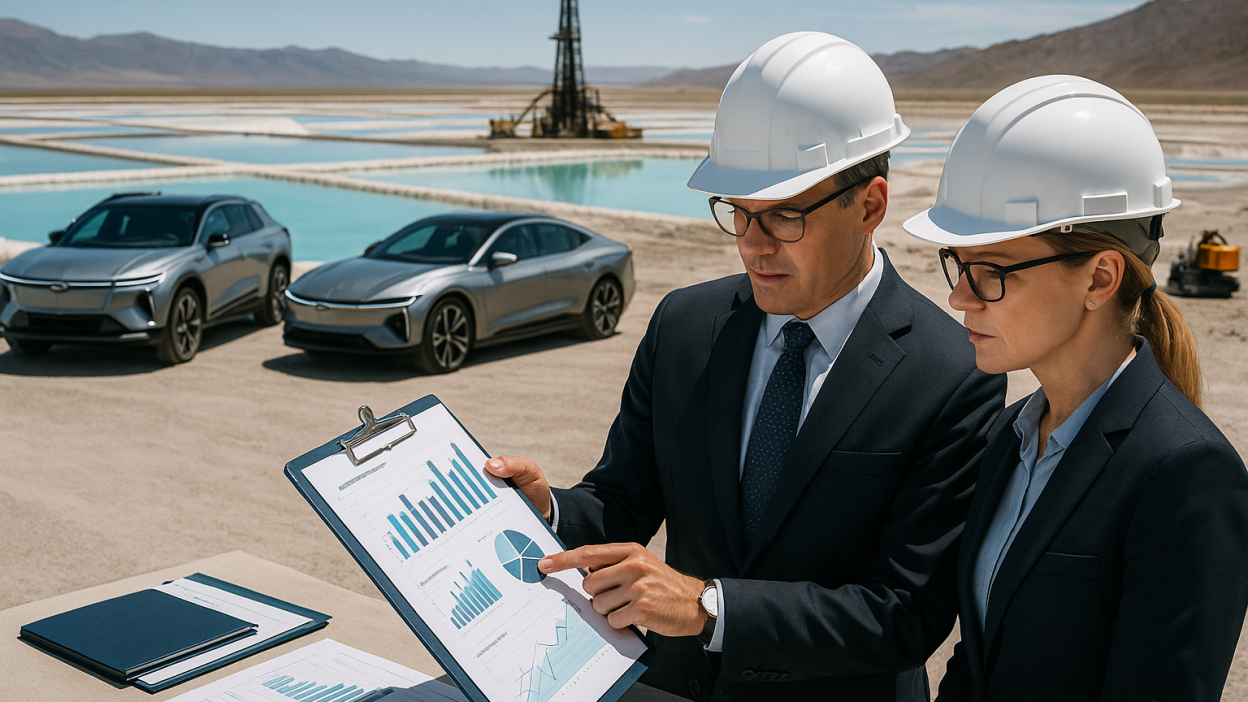Trump Administration Eyes 10% Stake in U.S. Lithium Miner Supplying GM: Strategic Moves in the EV Era
Lithium has emerged as one of the most strategically critical minerals. The Trump administration’s recent move to acquire a 10% stake in a U.S.-based lithium producer that supplies General Motors (GM) underscores the high stakes involved. This initiative is more than a corporate investment—it signals a deliberate effort to secure domestic supply chains for the green energy transition while asserting U.S. leadership in critical mineral markets.
Lithium, often called “white gold,” powers the batteries of EVs, smartphones, and renewable energy storage systems. For the average American, this development may seem distant, but its effects ripple through the economy, national security, and the fight against climate change. By gaining partial ownership, the U.S. government could potentially influence production priorities, pricing, and distribution, ensuring that domestic industries like GM have reliable access to this vital resource.
This strategic move also raises questions about the balance between government intervention and market forces, as well as the broader implications for global supply chains and international competition. In this article, we will explore the economic, technological, and societal impacts of the administration’s decision, examining what it means for consumers, automakers, and the future of the EV industry.
Why Lithium Matters More Than Ever
Lithium has become indispensable in the energy transition:
-
Battery Production: Lithium-ion batteries power EVs, grid storage, and consumer electronics. Demand is skyrocketing as EV adoption accelerates.
-
Strategic Resource: Countries are increasingly aware that control over lithium reserves can translate into geopolitical leverage. China, for instance, dominates much of the battery supply chain, prompting U.S. policymakers to secure domestic sources.
-
Economic Opportunity: Lithium mining and processing can create high-value jobs and stimulate regional economies in mining areas like Nevada and North Carolina.
For GM, consistent lithium supply is critical to maintain EV production schedules and cost efficiency. By securing a stake, the government not only ensures domestic availability but also signals to the global market that U.S. EV ambitions are backed by concrete resource strategies.
The Mechanics of the 10% Stake Acquisition
While details are still emerging, partial government ownership generally involves:
-
Equity Investment: Acquiring 10% of shares allows for partial decision-making influence without taking full operational control.
-
Strategic Oversight: The government may participate in board decisions, influencing production goals aligned with national interests.
-
Market Signals: Such a move reassures automakers, investors, and international partners about the stability and security of U.S. lithium supply.
This approach is reminiscent of other strategic commodity interventions, such as U.S. involvement in rare earth minerals, where state-backed investments stabilize critical supply chains in the face of global competition.
Implications for GM and the EV Industry
For GM and other domestic automakers, government involvement in lithium production could:
-
Mitigate Supply Risks: EV manufacturers often face bottlenecks in raw materials. A government-backed stake reduces the likelihood of supply disruptions.
-
Control Costs: Partial ownership could stabilize lithium prices, helping automakers manage battery production costs and, ultimately, vehicle pricing for consumers.
-
Accelerate EV Production: Reliable lithium access allows GM to scale EV manufacturing more aggressively, supporting national goals for carbon reduction and energy independence.
However, this move could also introduce bureaucratic oversight and slower decision-making, which automakers must navigate carefully.
Economic and Political Considerations
Government participation in a private lithium producer has broader economic and political ramifications:
-
National Security: Lithium is critical for defense applications, including military batteries and energy storage systems. A stake ensures domestic control over strategic resources.
-
Market Dynamics: The government’s involvement may affect pricing, potentially prompting international competitors to adjust strategies or accelerate their own domestic investments.
-
Investor Confidence: Equity markets may react positively, seeing government involvement as a stabilizing factor—or cautiously, fearing political interference in profit-driven operations.
The initiative reflects a balance between strategic national interest and free-market principles, highlighting the nuanced policy approach required for emerging energy markets.
Societal Impact: Jobs, Communities, and Sustainability
Lithium mining is not without its social implications:
-
Employment Opportunities: Expanding production could generate high-paying jobs in regions near mines, boosting local economies.
-
Community Engagement: Responsible mining practices, environmental safeguards, and transparency are essential to ensure local communities benefit without adverse effects.
-
Sustainability Challenges: Lithium extraction consumes water and energy, raising environmental concerns. Government participation could mandate stricter sustainability practices, aligning mining with broader climate goals.
This initiative thus represents a convergence of economic, environmental, and societal interests, reflecting the complexity of modern resource policy.
Global Ramifications
The U.S. move will be closely watched internationally:
-
Competitor Reactions: Countries with lithium reserves, like Chile, Argentina, and China, may reevaluate export strategies or accelerate domestic battery production.
-
Supply Chain Security: By securing domestic lithium, the U.S. reduces reliance on foreign sources, shielding EV supply chains from geopolitical tensions.
-
Technology Leadership: Stable access to lithium supports R&D in battery technology, potentially positioning the U.S. as a leader in next-generation energy storage solutions.
The Trump administration’s bid to acquire a 10% stake in a U.S. lithium producer supplying GM is more than a headline—it is a strategic intervention with far-reaching implications. From stabilizing domestic EV supply chains to reinforcing national security and fostering sustainable economic growth, this move reflects a forward-thinking approach to critical resources in the 21st century.
For consumers, it could mean more reliable EV availability and potentially lower prices. For automakers, it ensures predictable lithium supply amidst a competitive global market. And for society at large, it demonstrates that strategic government involvement can balance economic growth, environmental responsibility, and technological advancement.
As the EV revolution accelerates, actions like these highlight the intertwined nature of politics, industry, and technology—and remind us that the transition to a cleaner, electrified future is as much about resources and strategy as it is about innovation.
FAQs
Q1: Why is lithium so important for electric vehicles?
A: Lithium is a key component in rechargeable batteries for EVs, enabling longer ranges and faster charging.
Q2: How will government ownership affect the lithium market?
A: It could stabilize supply, influence pricing, and provide strategic oversight without fully nationalizing the company.
Q3: What are the risks of government involvement?
A: Potential risks include bureaucratic delays, reduced operational flexibility, and investor concerns about political interference.
Q4: How does this impact GM specifically?
A: GM benefits from more secure lithium access, which supports battery production, cost control, and EV scaling.
Q5: Are there environmental concerns with lithium mining?
A: Yes, lithium extraction can consume large amounts of water and energy. Government involvement could enforce sustainable practices.
Q6: Will this influence global lithium markets?
A: Likely, as it signals U.S. commitment to domestic supply and may prompt competitor nations to adjust strategies.
Q7: Can this create more jobs in the U.S.?
A: Yes, expanding lithium production can generate high-value jobs in mining, processing, and associated industries.
Stay ahead of the evolving EV and energy landscape. Subscribe to our newsletter for the latest insights on critical minerals, electric vehicles, and strategic government-industry developments. Get expert analysis delivered directly to your inbox and make informed decisions in a rapidly changing world.
Note: Logos and brand names are the property of their respective owners. This image is for illustrative purposes only and does not imply endorsement by the mentioned companies.



